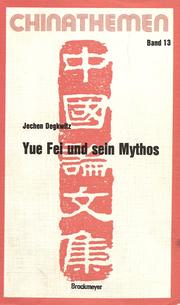
Yue Fei und sein Mythos
By Jochen Degkwitz
Subjects: History, Chinese literature, Fiction, Biography, History and criticism, Generals
Description: In China, it has at all times been common practice to turn the past into an allegory for the present. Most naturally, being used as a vehicle to discuss present problems, history is often truncated or even totally deformed. In the case of Yue Fei, the 12th century warrior who fought foreign invasion and was killed by an administration favoring appeasement, history apparently has never even been properly written. Yue Fei's story has, though, soon after his death become a matter of great popularity and it has been written and re-written many times in the following centuries, never just to tell the tale, but always to express some political point of view, adding up to quite an extensive body of mostly popular literature. For political reasons again, in mid-18th century there originated a full-fledged colloquial-style novel about Yue Fei, known by several titles such as “Shuo Yue quan zhuan”or “Jingzhong Yue zhuan”, which incorporates many a twist and turn that was added to the tale in one of the earlier versions. This novel has to be viewed as the culmination of the development of the myth of Yue Fei, and it enjoys great popularity even today, not as a book alone, but also as the base for modern radio plays and TV-series. The present study attempts to trace back to its various origins, both historiographic and legendary, the myth of Yue Fei as it is set forth in this novel, and to explain the basic political implications thereof, finally searching it for the main ideological strains that account for the up to date unbroken•popularity of Yue Fei as a national hero.
Comments
You must log in to leave comments.